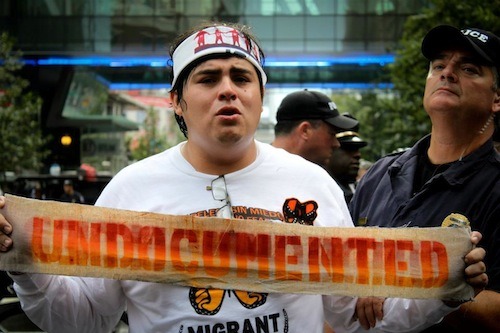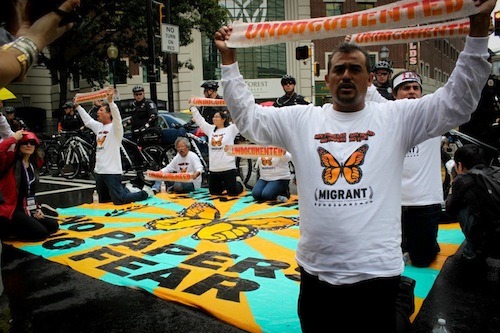Why did immigration officials release a group of undocumented activists arrested outside the DNC?
September 05, 2012
Source: UnivisionNews.Tumblr.com

Despite the threat of deportation, Julio Sánchez protested in Charlotte on Tuesday.
After police arrested ten undocumented activists protesting outside the Democratic National Convention on Tuesday, those arrested were turned over to federal immigration authorities.
Hours later, however, the activists were released from custody by U.S. Immigration and Customs Enforcement (ICE).
“ICE has taken no enforcement action against the Ride for Justice activists arrested Tuesday in Charlotte,” an ICE spokesperson told USA Today in a statement. “ICE is focused on smart, effective immigration enforcement that prioritizes the removal of criminal aliens, recent border crossers and egregious immigration law violators, such as those who have been previously removed from the United States.”
On its face, the move by ICE shouldn’t be surprising. The majority of the activists arrested likely qualify for one of two recent programs aimed at stemming unwarranted deportations, according to Tania Unzueta, a spokesperson for the group, which has been touring the country with the UndocuBus campaign.
But two of the protestors had previous immigration infractions, Unzueta said, which she believes would have led to their deportation under other circumstances.
“There’s something about public pressure,” Unzueta said. “ICE officials told us that this was a high-profile case, and to me, that means that when people have community behind them, they really are treated differently than other people are.”
According to David Leopold, general counsel with the American Immigration Lawyers Association, however, the added attention from cameras and notebooks might not have been a deal breaker.
“It’s always a little safer to have the media around, there’s no question about it,” Leopold said. “But I don’t know whether in this circumstance that made a difference.”

Ideally, “prosecutorial discretion” should halt low-priority deportations; in practice, it’s affected few cases.
A number of factors could have contributed to the decision by immigration officials to release the activists with prior immigration offenses, Leopold said.
To begin with, two policy changes have altered the immigration enforcement landscape in the past year and a half. The Deferred Action for Childhood Arrivals (DACA) program announced by President Obama in April allows young undocumented immigrants work and live in the US. In addition, a 2011 Homeland Security memo gives federal immigration authorities the power to exercise “prosecutorial discretion” in non-criminal, low-priority cases.
“Whether they qualify for DACA or prosecutorial discretion, the law has always favored release, that’s nothing new,” said Leopold. “So that doesn’t surprise me that they were released by ICE, pending an ICE hearing…If they let them go without any processing, that is unusual.”
That’s exactly what happened, according to 24-year-old Julio Sánchez, an organizer from Chicago who has been traveling on the UndocuBus.
He says that he and another activist, 45-year-old Eleazar Castallanos, an Arizona day laborer, were held in ICE custody yesterday after the other eight protestors were released. Sánchez was apprehended twice while trying to cross the border nine years ago, but he was a minor at the time. Castellanos, according Sánchez, also had a prior immigration infraction on his record.
Sánchez and Castallanos refused to speak with any authorities beyond giving their names and dates of birth, and eventually the ICE agents allowed them to leave, without mention of any future appearance in federal immigration court or further action against them:
“After 30 minutes, he said, ‘Ok we’re not going to do anything about it, but you should be careful for the next time, because you’re already on the record and immigration could send someone to your house.’”
Because of his age, Sánchez may qualify for deferred action while Castallanos does not. Castallanos could not be reached for comment, so it is unclear whether he would qualify for prosecutorial discretion.
“Once we make our problem public, it’s really hard for immigration to put us into deportation,” Sánchez said. “Since I did it publicly, they didn’t want all the attention and they let me go.”
From the standpoint of an immigration attorney, Leopold was more skeptical.
“The fact that they weren’t issued a notice to appear, does not mean that they won’t be issued a notice to appear,” he said.
Regardless of the motivations that led ICE to release the protestors, Leopold agrees with the decision.
“I would rather have immigration releasing people who are protesting and not harming anyone than arresting them and letting some violent guy go free,” he said. “The first amendment applies to everybody, so maybe ICE was evaluating that and did the right thing there.”
(Photos: Facebook/UndocuBus)